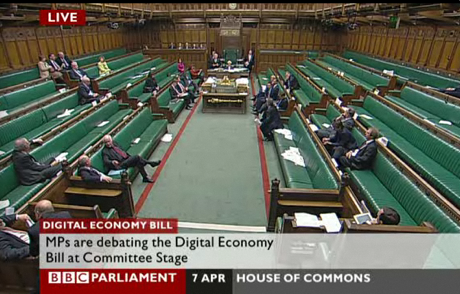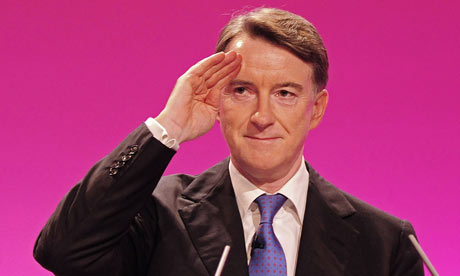Posts Tagged “digital economy bill”
 Shock result (not): in another depressingly familiar sellout, the ConDem government is not going to repeal the Digital Economy Act. Shock result (not): in another depressingly familiar sellout, the ConDem government is not going to repeal the Digital Economy Act.
You might remember this epic law fail that was passed just before the election. It was New Labour’s dying gift to the corporate media/culture industry. It allows them to accuse people of infringing copyright, at which point whole households can face fines or even disconnection from the internet. This is purely on the say so of entertainment companies or other copyright holders, and most people won’t have the money to fight it in court. The Act was basically a case of Labour letting the entertainment industry write the law, in order to safeguard their own massive profits. This was then rushed through parliament with no time for proper scrutiny during the “wash up” phase before an election, where the parties push through things they all agree on.
Lib Dem lords originally supported the then Digital Economy Bill, which led to a grassroots rebellion within the party of the many members who are concerned about the future of a free internet. As a result of this, Lib Dem MPs withdrew their support when it was voted through, and Nick Clegg promised to repeal the Act if elected.
Well, guess what? The new Tory spokesman for broadband, Jeremy ‘Rhyming Slang’ Hunt, has announced the ConDem coalition will NOT be repealing the Digital Economy Act. Despite huge opposition from the public, and people promising civil disobedience against this ridiculous law, it will remain in effect.
Yet again the idea that the Lib Dems are in government to be a good influence on the Tories has been exposed for the lie it is. Clegg and co. trumpeted before the election how they thought it was disgraceful such a bad piece of legislation had been rushed through. But now in power they’re quite willing to go along with their new boss, former spin doctor for media company Carlton Communications, David Cameron. Yet another Lib Dem sellout from those so desperate for ministerial seats they’ll ditch any principle necessary: nuclear power, full proportional representation, stopping the renewal of Trident and now restrictions on the internet. What a shower of bastards.
Check out this site for info on the campaign to repeal the Act.
 1 Comment »
1 Comment »
 As you can see, MPs took their duty to turn up and discuss this important bill very seriously Last week, the UK parliament showed its utter bankruptcy by passing the spectacularly bad Digital Economy Act into law with virtually no debate.
The law as regards the internet in the UK is now a total shambles, a pigs ear which has been written by the corporate culture industry to safeguard their own profits.
Noted knobhead and Subbuteo player Richard Mollet is reportedly delighted. He is one of the leading corporate music industry lobbyists, and now a Labour election candidate, who helped get this dogs dinner passed.
For the rest of us however, it’s another illustration of how the UK parliament is completely undemocratic and has absolutely no interest in defending the rights of UK citizens when they conflict with corporate profits. A big campaign was mounted against the bill, with thousands contacting their MPs.
But, unfortunately, this strategy has failed. It’s time to start talking about how we defend innocent filesharers when the demands for payment start rolling in for companies who can claim copyright infringement. One of the worst things about this law is that it means that in many cases a company will just have to accuse someone of having infringed on their copyright, and, like with libel laws, most won’t have the money to defend themselves in court and will have to just pay a fine.
One of the ridiculous consequences of this is that people who HAVEN’T EVEN BEEN FILESHARING are getting accused. Check out this story about an Inverness couple who received a demand for payment for alleged filesharing, and who didn’t even understand what they were being accused of!
Of course, it’s hardly surprising that MPs don’t grasp these issues properly. Many contributions to the debate in parliament showed that they have an understanding of the internet about as good as your angry Dad when Windows breaks.
For example, Stephen Timms, who is Britain’s “Minister for the Digital Economy”, thinks that an Internet Protocol (IP) address actually stands for “Intellectual Property”! What more proof do we need that all this chat about the digital economy is nothing more than a cover for for more corporate profits?
 Letter send by the Minister to other MP's Although, credit where credit is due, even I have to respect defending this piece of capitalist legal vomit through a Star Wars metaphor:
The advocates of illegal downloading-for that is what it is-have succeeded in painting a picture that is very seductive, but very misleading. The best way to illustrate this is by means of an old-tech linear-medium metaphor. In this metaphorical world that they have constructed, my hon. Friend Mr. Watson, who is in his place but not paying attention, is Luke Skywalker. He is the little guy, the plucky loner fighting the machine. Clay Shirky is Obi Wan Kenobi, the wise, broad, almost mystical guru figure. Peter Mandelson is obviously Darth Vader. Rather more counter-intuitively, however-this is where the metaphor begins to fracture-the evil Sith Chancellor Palpatine, the most evil universally bad figure of all, turns out to be Steven Spielberg. That is who Luke Skywalker is fighting-the ultimate rights holder, the acme of creative content ownership. When Spielberg turns out to be the ultimate evil, we know that the metaphor-otherwise quite cleverly constructed by the freedom fighters-is not just flawed, but misleading, damaging and dangerous. When Spielberg is the ultimate evil, it turns out that creativity is the enemy. It is creativity that Luke and his pals are after.” Sion Simon, Labour MP for Erdington.
This transparent attempt to show the government is down wit da internets kidz will of course fail, once we start getting hit with pointless fines. Leftfield says: join us on the dark side, and get as much out of the net for free while we still can!

 No Comments »
No Comments »
The Open Rights Group, which is campaigning against the draconian Digital Economy Bill, say:
“On Thursday, our ‘Police’ visited the offices of the BPI, Conservative, Liberal Democrat and Labour parties, and UK Music, and presented them with notice that the Digital Economy Bill is disconnected, from democracy, human rights, public opinion and sound business sense”
Time is running out before the UK parliament passes this law without debate! Write to your MP now demanding that the Digital Economy Bill is not passed without scrutiny in the dying days of this parliament!
 No Comments »
No Comments »
 Peter Mandelson salutes his paymasters, the record industry As Leftfield has already reported, Labour, the Tories and Lib Dems have been united on at least one thing in the run up to the election: their desire to allow the corporate culture industry write the law when it comes to filesharing on the internet.
The epic law fail that is the Digital Economy Bill basically gives the British Phonographic Industry, UK Music and other corporate lobbyists everything they want: severe punishments for people who are caught sharing files on a not for profit basis online, up to disconnecting whole houses from the internet. Coincidentally, the Director of Public Affairs for the BPI is a Labour candidate in the election.
The bill is one of the more blatant examples of how corporations have a complete stranglehold over all the major political parties. Unfortunately for both the parties and their paymasters however, they had reckoned without the power of pissed off internet users.
 BPI's director of public affairs, Labour candidate, and knobhead Richard Mollet A wave of protest has crashed on to Westminster in recent weeks against the draconian bill. Last week over a thousand people protested outside Parliament, on top of the huge numbers of people getting in touch with their MPs. And members of the major parties themselves have been up in arms about the proposals. Lib Dems, to their credit, have had a grassroots rebellion against their own party leadership on the issue, after Lib Dem Lords (going against their own party’s policies) actually introduced amendments that made the bill WORSE.
As a result of the internal pressure, Lib Dem MPs have been forced to say they will withdraw all support for the bill being sent into the “wash-up”. The wash-up is the name given to the last few days of parliamentary business before an election, in which all the major parties co-operate to push through things they all agree on, away from the scrutiny of the media and the public. If the bill gets into this stage it will become law in the next couple of weeks without any kind of the usual debate and scrutiny given to new laws.
This week, an appeal was launched to raise funds for an anti-bill advertising campaign. The initial target was to raise £10,000, but this was beaten in a few hours and so it was upped to £20,000.
The pressure is being felt by Labour MPs as well, as one of them, Austin Mitchell, has changed his mind about his previous support. He’s tabled an early day motion which says:
“That this House believes that the Digital Economy Bill [Lords] is too important to be taken further in the last days of a dying Parliament; and considers that a bill with so many repercussions for consumers, civil liberties, freedom of information and access to the internet should be debated and properly scrutinised at length and in detail, with a full opportunity for public discussion and representation in a new Parliament after the general election and not rushed through in the few days that remain in this Parliament.”
Write to your MP now and demand that they support Early Day Motion 1223! The 24,000+ words in the digital economy bill deserve more than a couple of days putting it through on the nod. We people of the internet may well be on the verge of a massive victory against the corporate culture industry!
 7 Comments »
7 Comments »
 Ask any kid: pirates are cool. The seven seas, treasure, saying “Aaarrrr!!”. All that shit is gold. Ask any kid: pirates are cool. The seven seas, treasure, saying “Aaarrrr!!”. All that shit is gold.
For years the record industry tried to make downloading music and filesharing sound more dodgy than it was by calling it “piracy.” They’ve now come finally to realise they’ve created a monster. Not only do we all love pirates due to characters like Captain Hook or Jack Sparrow, but the pirate flag and the term pirate has become a rallying cry for the international movement to legalise not-for-profit filesharing.
“We should change the word piracy,” said International Actor’s Federation head Agnette Haaland.
“To me, piracy is something adventurous, it makes you think about Johnny Depp. We all want to be a bit like Johnny Depp. But we’re talking about a criminal act.”
This week, the International Chamber of Commerce teamed up with unions to try and scare us all by claiming that downloading music and films from the internet is going to put everyone out of work and pretty much destroy the world. Their major report claims that 1.2 million jobs and 240 billion euros worth of European commerce could be wiped out by 2015.
The problem with this of course is that it a) doesn’t take account of all the people that wouldn’t have bought/can’t afford to buy what they download, and b) they’ve just taken a figure, and equated that with jobs. Except we actually know that the record industry isn’t some kind of charity handing out jobs to the needy. If we had all coughed up those 240 billion Euros, most of it would have ended up in the profit side of record corporation and movie studio bank balances.
It’s a real shame that some European trade unions have joined up with this industry crusade, and are helping lead the charge for ordinary people to be kicked off the internet and face criminal charges. It’s nothing but going along with the bosses agenda, and will do nothing to increase the credibility of unions with the general public.
The blatant scare mongering of the report, which received widespread media coverage, is clearly intended to justify the incredibly draconian and shit Digital Economy Bill currently being rushed through the Westminster parliament with the support of all major parties.
In fact, the entertainment industry is booming. The report itself acknowledges that profits and job creation outweighs the cost of “piracy”. And the movie business is booming, with record takings at cinemas.
The record industry has basically been given the opportunity to write a piece of law for the UK via the Digital Economy Bill. It’s totally idiotic. In the current context, something that millions of people do every day – share files online – has become an act of defiance against the government and the capitalist class.
The fact of the matter is that filesharing technologies on the internet make the for-profit capitalist entertainment industry obsolete. The record industry execs today are just like feudal lords in the 18th century, watching in horror as their source of wealth vanishes in the face of new technology.
But just like the old lords, they’re not going down with out a fight. Take James Murdoch, son of Rupert and heir to the throne of probably the world’s greatest capitalist media empire:
“There is no difference with going into a store and stealing Pringles or a handbag and taking this stuff. It’s a basic condition for investment and economic growth and there should be the same level of property rights whether it’s a house or a movie. The idea that there’s a new consumer class and you have to be consumer-friendly when they’re stealing stuff. No. There should be the same level of sanctity as there is around property. Content is no different. They’re not crazy kids. No. Punish them.”
Those are fighting words James!
Fuck the Digital Economy Bill! Legalise not-for-profit filesharing now!
 Bring it on James Murdoch!
 4 Comments »
4 Comments »
 The outcome of government policy At the coming election the three major UK parties will work hard to convince you that there’s a big difference between them, and that they deserve your vote more than others.
But Labour, the Tories and the Lib Dems are all united in their desire to make the internet shite. The government’s Digital Economy Bill looks like it will be rushed through parliament before the election because it’s supported by all the major parties.
The bill is a spectacular example of political knobhead-ery. It is a dogs dinner of law, aimed at helping massive entertainment corporations continue to rake in profits at our expense, and potentially limit our access to controversial information online. It shows just how much our political process is controlled by powerful companies that are beyond democratic oversight.
The bill proposes a “three strikes” rule, so that those accused of illegal filesharing more than three times will have their internet connections cut off. That means you, looking for things you wouldn’t otherwise see or hear on megaupload or Pirate Bay. This kind of harmless activity would lead to you being deprived of everything that we use the internet at home for, an increasingly important part of most young people’s lives. A majority of the world’s population now regard access to the internet as a fundamental human right, and are supported in this by the UN.
Let’s be clear-being able to get things for free on the internet is one of the greatest advances of the modern age. Being one of the oldest members of SSY, I can tell you that kids today don’t know they’re born. I remember the days when if you wanted to hear new music you had to save up to maybe buy one CD in a month. Every once in a while you might get a new video, and you were stuck with whatever council telly decided you got to watch. The Dark Ages of Entertainment in other words. Today, that’s all different, and the ability for cultural participation is enhanced unimaginably compared to what it was like growing up in the 90s.
But of course this presents the capitalist market with a problem. Propaganda on the issue of filesharing likes to try and make us think of some poor impoverished artist somewhere struggling by as we take away their livelihood. But we all know that the people who have really suffered are the culture industry, the massive entertainment corporations who monopolise the rights to the works of others so they can parasite off their creativity. These people have now pushed the government into putting forward a law that aims to reduce filesharing by 70%.
But it doesn’t stop there. Anyone providing internet access is to be made responsible for the actions of those using it. What that effectively means is that we’ll probably see the end of wee cafes providing wi fi access, as the government forces them to keep detailed records of what every single customer does, an unbearable burden for small businesses. Community centres, libraries and universities will face the same obligations. The government recognises that many universities already have stringent copyright protection in place on their networks, and wants to expand it. If you’ve ever stayed in uni halls and gone online, you may well know what this will mean-the possibility of arbitrary disconnection for doing things that are perfectly legal, and the internet generally being really slow and rubbish.
But perhaps the worst aspect of the proposed law is that it will make copyright law work like libel laws. Under our libel laws, if you write something nasty about someone else, they can take you to court. It is then essentially on you to prove that what you said was true. In other words, you are considered to guilty until proven innocent of lying. This has led to many ridiculous libel judgments, many involving politicians trying to cover stuff up. But more importantly, it means that unless you’ve got plenty of money and good lawyers, you can’t defend yourself, and so the rich and powerful can often stop things being printed that they don’t like.
Similar principles are going to be applied to websites under the Digital Economy Bill. Companies will have the right to demand the blocking of websites which they argue have “significant amounts” of material that infringes copyright. This could well lead to many people in the UK being unable to look at youtube, for example. Websites could be pulled down by their internet service providers without even knowing. In theory, these applications could be challenged in court, but only if you’ve got the dough for lawyers. The vast majority of small-time website operators won’t be able to afford this, and will just have to go along with it.
 This raises the potential that companies could then abuse the system, putting up claims against websites they don’t like. The US, which already has passed some pretty shitey laws, we’ve already seen Microsoft try and block leaks website Cryptome from publishing sensitive documents through spurious copyright claims. In other words, this law opens the door to severe corporate censorship of the internet. This raises the potential that companies could then abuse the system, putting up claims against websites they don’t like. The US, which already has passed some pretty shitey laws, we’ve already seen Microsoft try and block leaks website Cryptome from publishing sensitive documents through spurious copyright claims. In other words, this law opens the door to severe corporate censorship of the internet.
This stuff is all politically bad. It is pro-corporate bullshit, which has the ultimate aim of taking money out of your pocket and putting it in the hands of rich people. But on a more basic level, it will also slow down the internet, prevent some of the best things on the internet from continuing, and generally make our lives a bit more rubbish. With all the mainstream parties lined up behind this campaign for shitness, what can we do?
The Open Rights Group (ORG) is an independent campaign group desperately trying to pull together as wide opposition to the bill as possible. They’ve got details on their site of how to get in touch with the government to express your opposition, and for anyone who’s down south or could make it to London, they’ve called a demo against disconnection on Wednesday 24th March, outside the Houses of Parliament at 17.30. Also, if you join ORG you get a free signed copy of the novel ‘Little Brother’ by Cory Doctorow.
Across Europe (and around the world) the threat to internet freedom by corporate controlled governments has led to the formation of Pirate Parties, particularly in Sweden where the party has been very successful. In the UK there’s a Pirate Party as well, although it looks unlikely to have anything like the same impact on the political system.
For those of us who are socialists, it’s time to get wise on these issues. The right of the working class to get entertainment outside of the market system is well worth defending. Yes, there are some issues about how to compensate artists for their work, but already extensive work has been done to resolve this, and the amount of artists and writers who support groups like ORG shows that the drive for a crappy internet isn’t driven by them.
What gives me hope is that for over 10 years now I’ve seen the evolution of filesharing technologies, and the overcoming by ingenious ordinary folk of all the attempts by governments and their corporate paymasters to stop us doing it. Alongside the political campaigning, the continued efforts of nerds everywhere to overcome internet censorship and damage benefit us all. In the coming weeks, Leftfield intends you to bring you comprehensive guides to how to get stuff online, before the government messes things up.
At the end of feudal society, the invention of new industrial technologies helped make fedualism obsolete, and usher in the new capitalist era. Today, the power of the internet ultimately shows that the monopolistic capitalist market is out of date, because we as a society can do things better if we work together in a non-profitable, collaborative and collective way. It’s a glimpse of how things would work under socialism, and socialists should be at the forefront of defending it.
Bonus: SSY member ‘The Enlivened Bandit’ on the politics of filesharing.
 3 Comments »
3 Comments »
|
 Shock result (not): in another depressingly familiar sellout, the ConDem government is not going to repeal the Digital Economy Act.
Shock result (not): in another depressingly familiar sellout, the ConDem government is not going to repeal the Digital Economy Act.





 Ask any kid: pirates are cool. The seven seas, treasure, saying “Aaarrrr!!”. All that shit is gold.
Ask any kid: pirates are cool. The seven seas, treasure, saying “Aaarrrr!!”. All that shit is gold.



 This raises the potential that companies could then abuse the system, putting up claims against websites they don’t like. The US, which already has passed some
This raises the potential that companies could then abuse the system, putting up claims against websites they don’t like. The US, which already has passed some 
 Entries (RSS)
Entries (RSS)